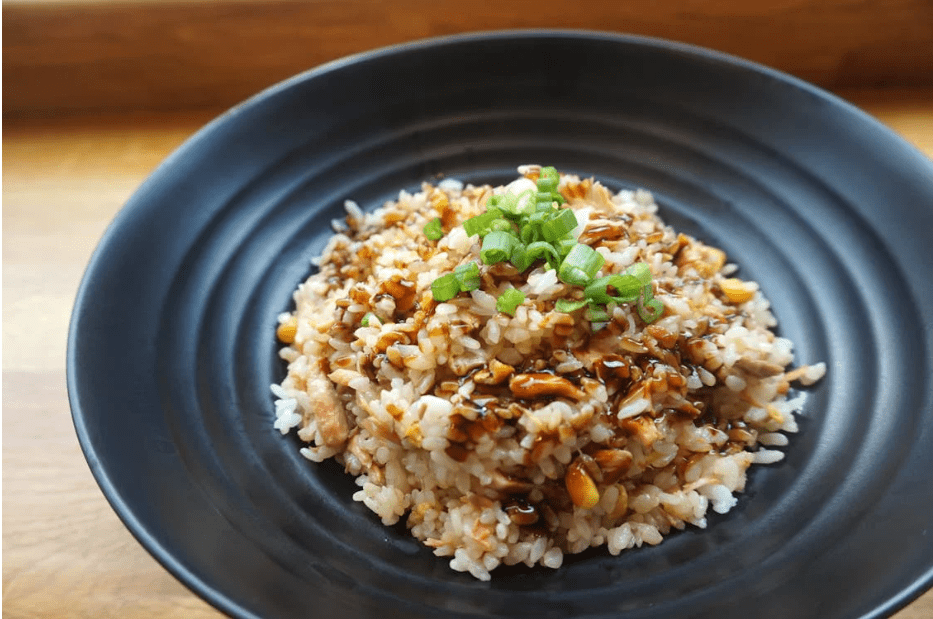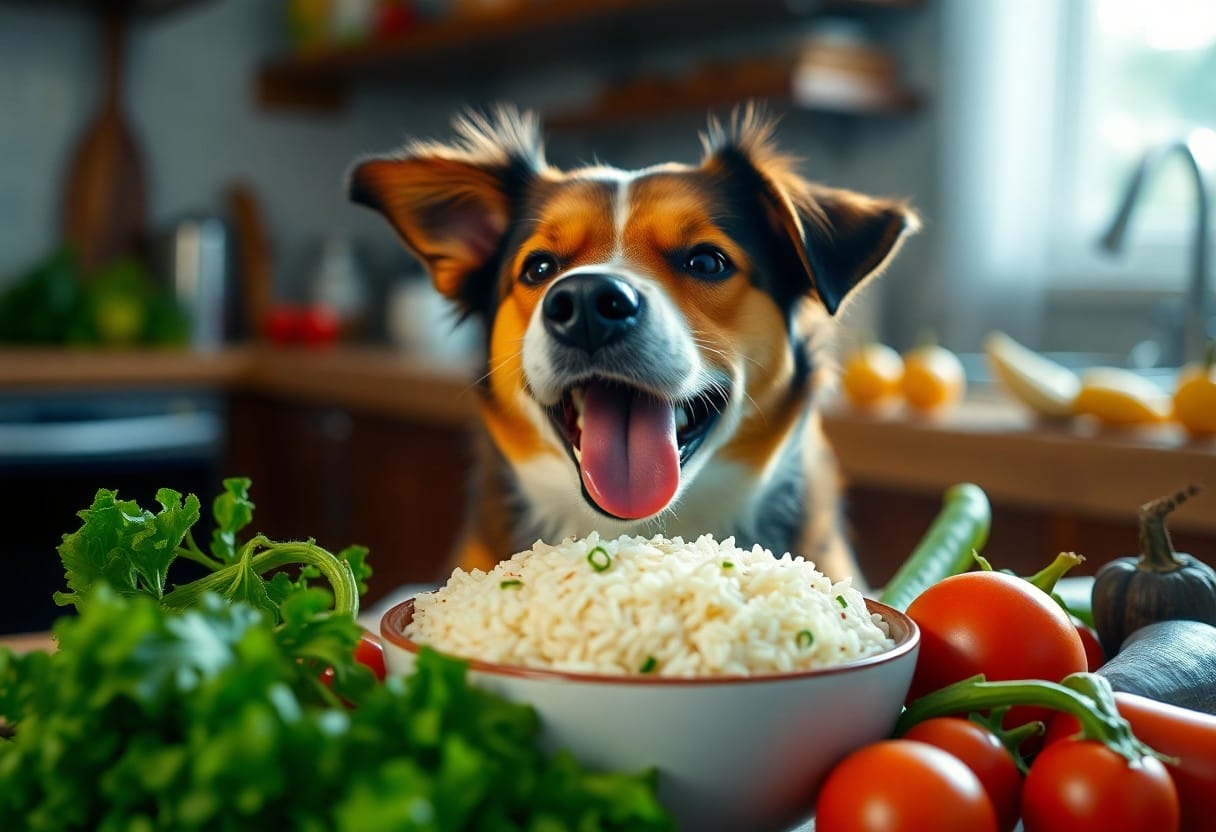
Benefits of Rice in Your Dog’s Diet - A Staple for Sensitive Stomachs
Share
As you navigate the complexities of your dear dog's diet, you may find yourself pondering the merits of various ingredients. If your furry friend suffers from a sensitive stomach, you'll be delighted to discover the soothing benefits of rice. This humble grain can be a lifesaver for dogs prone to digestive issues, providing a gentle, easily digestible source of nutrition. By incorporating rice into your dog's diet, you can help alleviate discomfort and promote overall well-being, ensuring your beloved companion leads a happy, healthy life.
Key Takeaways:
- Rice is a gentle ingredient that can help soothe a dog's sensitive stomach, making it an ideal addition to their diet.
- Incorporating cooked rice into your dog's meals can help ease digestive issues, such as diarrhea and vomiting, due to its easy-to-digest properties.
- A balanced diet that includes rice can provide your dog with the necessary nutrients and energy for optimal health, while also supporting a healthy gut.
Nutritional Benefits
A well-balanced diet is important for your dog's overall health, and rice can be a wonderful addition to their meals. As you consider adding rice to your dog's diet, you may be wondering about the nutritional benefits it provides. Rice is a rich source of carbohydrates, which are an excellent source of energy for your furry friend. You will be delighted to know that rice is also easy to digest, making it an ideal choice for dogs with sensitive stomachs. By incorporating rice into your dog's diet, you can help support their overall health and well-being.
As you explore the nutritional benefits of rice, you will discover that it is a versatile ingredient that can be used in a variety of ways. Whether you choose to feed your dog cooked white rice or brown rice, you can be assured that they will be receiving a nutrient-rich food that will help support their growth and development. With its low fat content and high fiber content, rice is an excellent choice for dogs who are prone to digestive issues or who are overweight.
Carbohydrates and Fiber
Fundamentally, fiber plays a vital role in maintaining your dog's digestive health. As you consider adding rice to your dog's diet, you will be pleased to know that it is an excellent source of fiber. Fiber helps to regulate bowel movements and prevent constipation, making it an important component of a healthy diet. You will also be delighted to know that rice is low in fat, making it an ideal choice for dogs who are prone to weight gain.
Furthermore, fiber helps to support healthy blood sugar levels and can even help to lower cholesterol levels. As you feed your dog rice, you can be assured that they are receiving a nutrient-rich food that will help support their overall health. With its high fiber content, rice is an excellent choice for dogs who are prone to digestive issues or who are overweight.
Essential Vitamins and Minerals
Besides providing carbohydrates and fiber, rice is also a rich source of important vitamins and minerals. You will be pleased to know that rice is a good source of manganese, selenium, and magnesium, which are all important for maintaining your dog's overall health. These vitamins and minerals help to support healthy bones, regulate metabolism, and boost the immune system.
Beside the vitamins and minerals, rice also contains antioxidants that help to protect against cell damage and reduce inflammation. You will be delighted to know that these antioxidants can even help to reduce the risk of chronic diseases such as arthritis and cancer.
Hence, it is clear that rice is a nutrient-rich food that provides a range of important vitamins and minerals. As you consider adding rice to your dog's diet, you can be assured that they will be receiving a well-rounded and balanced meal that will help support their overall health and well-being. With its high nutritional value and low risk of adverse reactions, rice is an excellent choice for dogs with sensitive stomachs, and you can feel confident that you are making a positive and informed decision about your dog's diet.
Digestive Health
You are likely aware that a healthy digestive system is imperative for your dog's overall well-being, and rice can play a significant role in maintaining digestive health. As a dog owner, you want to ensure that your furry friend is receiving the best possible nutrition, and rice can be a valuable addition to their diet.
One of the primary benefits of rice in your dog's diet is its ability to soothe sensitive stomachs. If your dog is experiencing digestive issues, such as diarrhea or vomiting, rice can be a gentle and easily digestible food that can help to calm their stomach. It is imperative to note that not all dogs are the same, and what works for one dog may not work for another, so it is always best to consult with your veterinarian before making any significant changes to your dog's diet.
Soothing Sensitive Stomachs
One of the most significant advantages of rice is its ability to ease digestive discomfort in dogs. If your dog is experiencing digestive issues, such as gas, bloating, or stomach upset, rice can be a valuable tool in helping to alleviate these symptoms. By adding rice to your dog's diet, you can help to reduce the risk of digestive problems and promote a healthy digestive system.
One of the primary reasons why rice is so effective at soothing sensitive stomachs is that it is low in fiber and easy to digest. This makes it an ideal food for dogs that are experiencing digestive issues, as it can help to reduce inflammation and promote healing in the digestive tract. Additionally, rice is a hypoallergenic food, meaning that it is unlikely to cause an allergic reaction in your dog, making it a safe and effective addition to their diet.
Easing Digestive Issues
After introducing rice into your dog's diet, you may notice a significant reduction in digestive issues. Rice can help to absorb excess water in the digestive tract, reducing the risk of diarrhea and promoting a healthy, solid stool. Additionally, rice can help to reduce inflammation in the digestive tract, which can help to alleviate symptoms of digestive disorders such as inflammatory bowel disease.
The benefits of rice in easing digestive issues are numerous, and it is an excellent addition to your dog's diet if they are experiencing digestive problems. By adding rice to their diet, you can help to promote a healthy digestive system, reduce the risk of digestive issues, and improve your dog's overall health and well-being. It is always best to consult with your veterinarian before making any significant changes to your dog's diet, as they can provide you with personalized advice and guidance on the best ways to use rice to support your dog's digestive health.

Allergy Relief
Many a dog owner has struggled with the distressing reality of their pet's allergies, watching as they suffer from uncomfortable skin irritations and debilitating digestive issues. As you navigate the complex world of canine cuisine, you may find yourself wondering if there's a simple solution to soothe your dog's sensitive stomach. Fortunately, rice can be a trustworthy ally in your quest for allergy relief. With its gentle nature and easy-to-digest properties, rice can help calm your dog's allergies and bring them much-needed comfort.
In fact, rice is often highly recommended by veterinarians as a staple for dogs with sensitive stomachs, due to its low-allergenic properties. As you consider adding rice to your dog's diet, you may be pleased to know that it can help alleviate a range of unpleasant symptoms, from itching and scratching to digestive upset. By incorporating rice into your dog's meals, you can help them feel more comfortable and relaxed, which is a profound relief for any devoted dog owner.
Hypoallergenic Properties
Hypoallergenic in nature, rice is an excellent choice for dogs with delicate stomachs, as it is less likely to trigger an allergic reaction. You can feel confident that by feeding your dog rice, you are providing them with a nutritious and gentle food that will help minimize the risk of discomfort and upset. As you explore the world of hypoallergenic foods, you may be heartened to discover that rice is a popular choice among dog owners who prioritize their pet's wellbeing.
Hybridizing the benefits of rice with other wholesome ingredients can create a powerful formula for allergy relief. You can try combining rice with other soothing ingredients, such as omega-3 fatty acids or probiotics, to create a comprehensive diet that addresses your dog's unique needs. By taking a thoughtful and informed approach to your dog's diet, you can help them thrive and flourish in the face of allergies.
Reducing Inflammation
Above all, rice is a potent anti-inflammatory agent that can help mitigate the damaging effects of allergies on your dog's body. You can effectively use rice to soothe your dog's inflamed digestive tract and calm their irritated skin. As you work to alleviate your dog's allergies, you may be relieved to find that rice can help reduce the severity of their symptoms and promote a sense of wellbeing.
At the heart of rice's ability to reduce inflammation lies its unique combination of anti-inflammatory compounds and easy-to-digest carbohydrates. As you explore the science behind rice's anti-inflammatory properties, you may be
interested to learn that it can help modulate your dog's immune system and regulate their inflammatory response. By harnessing the power of rice, you can help your dog feel more comfortable and relaxed, which is a truly wonderful thing for any devoted dog owner. Additionally, reducing inflammation can have a profound impact on your dog's overall health and wellbeing, making it an vital aspect of their care. By incorporating rice into your dog's diet, you can help them thrive and flourish, and that is a truly remarkable thing.
Weight Management
To effectively manage your dog's weight, it is important to consider the role of rice in their diet. As a dog owner, you are likely aware of the importance of maintaining a healthy weight for your furry friend, as excess weight can lead to a range of serious health problems, including diabetes, arthritis, and heart disease. By incorporating rice into your dog's meals, you can help them feel full and satisfied, while also supporting their overall health and wellbeing.
When considering weight management, the type and amount of food you feed your dog are vital considerations. You should aim to provide a balanced and nutritious diet that meets your dog's energy needs, without overfeeding them. Rice can be a valuable addition to your dog's diet, as it is a low-calorie and easily digestible carbohydrate source. By feeding your dog a balanced diet that includes rice, you can help them maintain a healthy weight, while also supporting their digestive health.
Low-Calorie Content
Above all, rice is a low-calorie food that can help your dog feel full and satisfied, without consuming excessive calories. As you consider adding rice to your dog's diet, you should be aware of the calorie content of their meals, to ensure they are not overeating. By choosing a high-quality dog food that includes rice as a main ingredient, you can help your dog maintain a healthy weight, while also supporting their overall health.
Above and beyond its low-calorie content, rice is also a gentle and easily digestible food that can help support your dog's sensitive stomach. If your dog is prone to digestive issues, such as diarrhea or vomiting, rice can be a soothing and comforting addition to their diet. By incorporating rice into your dog's meals, you can help alleviate digestive discomfort and support their overall health and wellbeing.
Satiety and Portion Control
On the subject of satiety and portion control, it is important to monitor your dog's food intake to ensure they are not overeating. As you feed your dog a diet that includes rice, you should be aware of their individual calorie needs, to prevent overfeeding. By controlling the amount of food your dog eats, you can help them maintain a healthy weight, while also supporting their overall health.
On the other hand, rice can also help your dog feel full and satisfied, which can make it easier to manage their portions. By adding rice to your dog's meals, you can help reduce their appetite, while also supporting their digestive health. This can be especially beneficial for dogs that are prone to overeating, as it can help them feel more satisfied and less hungry.
Considering the benefits of satiety and portion control, it is clear that rice can play a valuable role in your dog's diet. By helping your dog feel full and satisfied, rice can make it easier to manage their weight, while also supporting their overall health and wellbeing. As you consider adding rice to your dog's diet, you should be aware of the potential benefits of satiety and portion control, and how they can help your dog maintain a healthy weight and support their digestive health. You can help your dog avoid the risks associated with overeating, such as obesity and related health problems, by feeding them a balanced diet that includes rice and monitoring their food intake. By doing so, you can help your dog live a long and healthy life, free from the negative effects of excessive weight.

Preparing Rice for Dogs
Keep in mind, dear reader, that preparing rice for your canine companion is quite a straightforward process, but it does require some attention to detail to ensure your dog digests it properly. When your dog is suffering from a sensitive stomach, it is imperative to introduce rice into their diet in a way that is easy on their digestive system.
With the right approach, you can help alleviate your dog's digestive issues and ensure they lead a healthy and happy life. It is vital to note that rice should not be the sole component of your dog's diet, as it lacks certain imperative nutrients that your dog needs to thrive. However, as a temporary solution or as an addition to their regular meals, rice can be a very beneficial ingredient. Now, let us proceed to the specifics of preparing rice for your dog, starting with the cooking methods.
Cooking Methods
With the goal of making rice easily digestible for your dog, you should opt for plain and unflavored cooking methods. This means avoiding any harmful additives or seasonings that could exacerbate your dog's sensitive stomach. Boiling rice in water is a simple and effective method, ensuring the rice is fully cooked and soft. It is also important to note that you should not add any toxic substances, such as onions or garlic, which can be harmful to your dog.
With these considerations in mind, cooking rice for your dog becomes a straightforward process that can bring significant relief to their digestive issues. Always prioritize fresh and clean water for cooking, and avoid using stale or contaminated water that could introduce bacteria into your dog's food. By following these simple guidelines, you can create a nourishing and easily digestible meal for your canine companion.
Mixing with Other Ingredients
Before introducing rice into your dog's diet, it is advisable to consult with your veterinarian to determine the best approach for your dog's specific needs. Mixing rice with other ingredients, such as chicken or pumpkin, can create a wonderful and soothing meal for your dog's sensitive stomach. However, it is imperative to introduce these ingredients gradually to prevent any adverse reactions.
Before making any significant changes to your dog's diet, ensure you have a thorough understanding of their nutritional needs and any potential allergies they may have. Cooking for your dog can be a very rewarding experience, allowing you to provide them with tailored and personalized meals that cater to their unique requirements. By taking the time to prepare healthy and balanced meals, you can help your dog lead a happy and healthy life, free from the discomfort of digestive issues.

Common Concerns
Despite the numerous benefits of rice in your dog's diet, you may have some concerns about incorporating it into their meals. Your primary worry might be that rice is not a nutritionally complete food source for your canine companion, and overreliance on it could lead to an imbalanced diet. However, with proper planning and execution, you can easily avoid this pitfall and ensure your dog is getting all the necessary nutrients. You should also be aware that some dogs may have sensitivities or allergies to rice, so it's necessary to monitor your dog's health and adjust their diet accordingly.
As you consider adding rice to your dog's diet, you may also be thinking about the potential risks of overfeeding with rice, which can lead to weight gain and other health issues. It's necessary to find the right balance and ensure that rice is not replacing more nutritious food sources. You should also be mindful of the type of rice you're using, as white rice is generally easier to digest than brown rice, but may be less nutritious.
Overfeeding with Rice
Relying too heavily on rice in your dog's diet can be detrimental to their health. You must be cautious not to overfeed your dog with rice, as this can lead to a range of problems, including digestive issues and weight gain. To avoid this, you should introduce rice into your dog's diet gradually and in moderation, ensuring that it does not exceed the recommended daily intake.
Rice, being a high-carbohydrate food, should be fed in limited amounts to avoid causing an imbalance in your dog's diet. You should aim to provide a balanced and varied diet that includes a mix of protein, fat, and complex carbohydrates. By doing so, you can help prevent nutrient deficiencies and other health problems associated with overfeeding with rice.
Balancing the Diet
For your dog to reap the benefits of rice, you need to balance their diet carefully. You should aim to provide a mix of protein-rich foods, healthy fats, and complex carbohydrates, with rice being just one component of their meals. By doing so, you can help ensure that your dog is getting all the necessary nutrients for optimal health.
For the well-being of your dog, it's necessary to consult with your veterinarian to determine the best diet for your furry friend. They can help you create a personalized diet plan that meets your dog's unique needs and ensures they're getting all the necessary nutrients. It's also important to monitor your dog's health and adjust their diet as needed to prevent any potential health issues.
It is worth noting that a balanced diet is key to your dog's overall health and well-being. You should avoid making drastic changes to your dog's diet and instead introduce new foods gradually. By doing so, you can help prevent digestive upset and other health issues associated with sudden changes in diet. With a little planning and attention to detail, you can help your dog thrive on a diet that includes rice as a valuable component.
Summing up
Following this delightful exploration of the benefits of rice in your dog's diet, you are now well-equipped to make informed decisions about your furry friend's culinary needs. You have discovered that rice can be a staple for sensitive stomachs, providing a soothing and easily digestible source of nutrition. As you navigate the world of canine cuisine, you will find that incorporating rice into your dog's meals can be a wise and compassionate choice, especially for those prone to digestive upset. Your thoughtful consideration of your dog's dietary needs is a testament to your devotion and care, and it is a pleasure to guide you on this journey.
As you proceed to make rice a part of your dog's diet, you will likely notice a marked improvement in their overall health and wellbeing. You will delight in seeing your dog thrive, their sensitive stomach soothed by the gentle goodness of rice. And as you sit down to enjoy a meal with your furry companion by your side, you will appreciate the simple joys of sharing a nutritious and balanced diet with your beloved pet. Your decision to prioritize your dog's health will be richly rewarded, and you will find that the benefits of rice in their diet are a true blessing, bringing happiness and harmony to your household.
Frequently Asked Questions
What are the benefits of adding rice to my dog's diet, especially for those with sensitive stomachs?
Rice is a easily digestible carbohydrate that can be highly beneficial for dogs with sensitive stomachs. It helps to firm up stool, reduce diarrhea, and calm digestive upset, making it an excellent addition to their diet. Additionally, rice is a low-fat, low-protein ingredient that can help to minimize the risk of allergic reactions and intolerance.
Can rice help to alleviate symptoms of digestive issues in dogs, such as diarrhea and vomiting?
Yes, rice can be very effective in alleviating symptoms of digestive issues in dogs. The high fiber content in rice helps to absorb excess water and firm up stool, reducing the frequency of diarrhea. Furthermore, the easily digestible nature of rice can help to calm the digestive system, reducing the likelihood of vomiting and other gastrointestinal upset.
How should I introduce rice into my dog's diet, especially if they have a history of food allergies or sensitivities?
When introducing rice into your dog's diet, it's imperative to do so gradually to prevent digestive upset. Start by mixing a small amount of cooked rice with their regular food, and gradually increase the proportion of rice over several days. This will allow your dog's digestive system to adjust to the new ingredient, minimizing the risk of adverse reactions. Consult with your veterinarian for personalized advice on introducing rice into your dog's diet.
Can rice be used as a long-term dietary solution for dogs with sensitive stomachs, or is it only suitable for temporary use?
A: Rice can be used as a long-term dietary solution for dogs with sensitive stomachs, provided it is balanced with other nutrient-rich ingredients. While rice is a nutritious ingredient, it lacks imperative nutrients like protein, fat, and fiber. Therefore, it's imperative to combine rice with other ingredients, such as chicken, fish, or beef, to ensure your dog is receiving a well-balanced diet. Consult with your veterinarian to determine the best long-term dietary solution for your dog.
Are there any potential drawbacks or risks associated with feeding rice to dogs, particularly those with certain health conditions or allergies?
While rice can be a highly beneficial ingredient for dogs with sensitive stomachs, there are some potential drawbacks to consider. Dogs with certain health conditions, such as diabetes or obesity, may need to limit their rice intake due to its high carbohydrate content. Additionally, some dogs may develop an intolerance or allergy to rice, which can manifest in symptoms like itching, scratching, or digestive upset. If you notice any adverse reactions, consult with your veterinarian to determine the best course of action.
